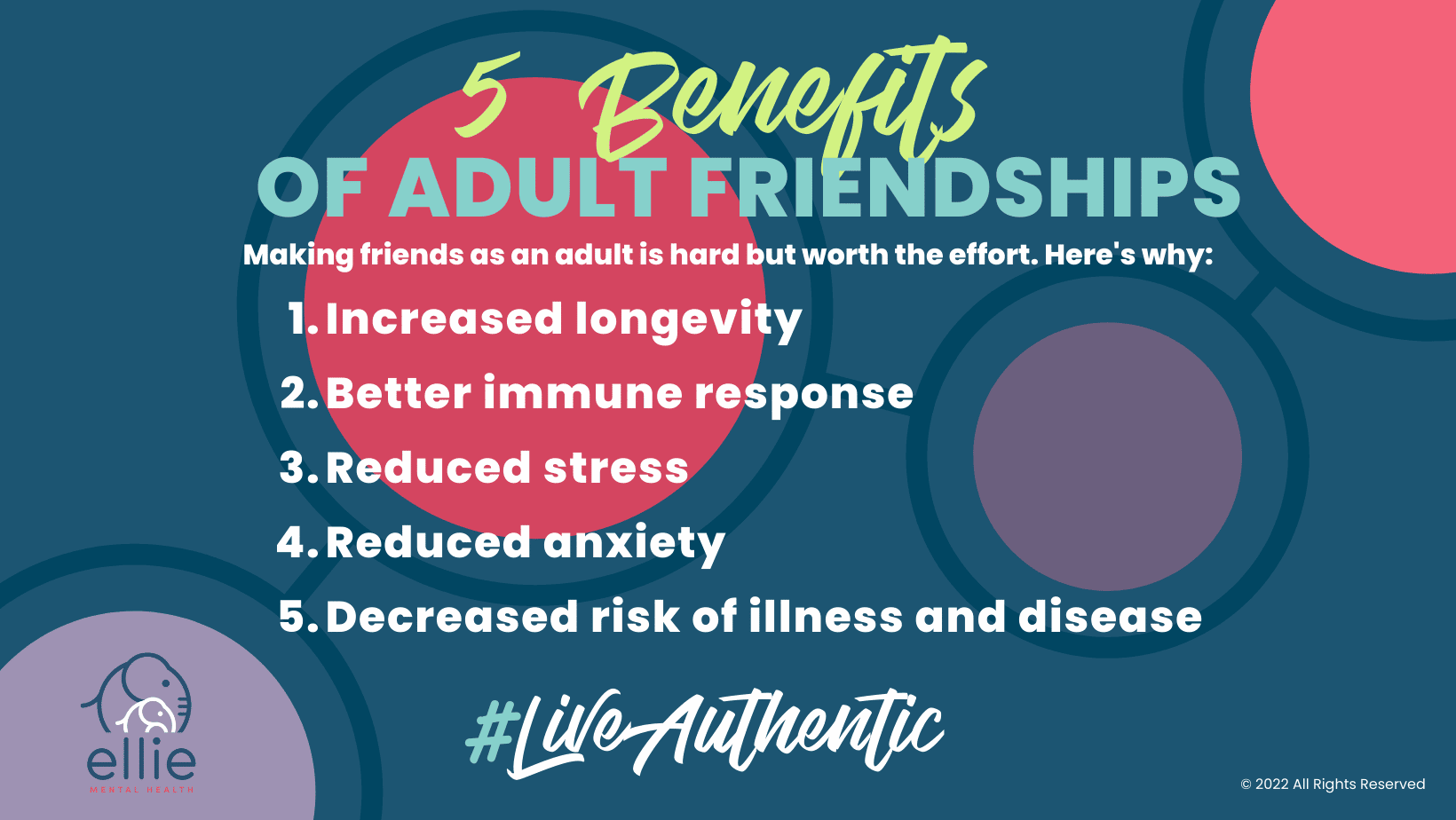If you can remember being in grade school, you can probably remember just how effortless it was to make friends on the playground. But as we age, these things change – and they change a lot.
Somewhere along the line between elementary school and early adulthood a distinct awareness sets in. It’s almost as if the world has tapped you on the shoulder to tell you it’s time to become more self-aware. Not only does this jolting change come with a greater degree of self-knowledge, but with a heightened awareness of others’ perceptions as well.
And it is here that things get complicated. That fearlessness you may have once felt as a child becomes muddied as you start to fear rejection, ridicule, and a host of other uncomfortable feelings. This newfound self-doubt and anxiety can make it difficult to seek out new relationships.
But just because making new friends can be SO much harder as an adult, this doesn’t mean you need friends any less than you did when you were child. The reality is that most adults in the US report feeling lonely.
But hope is not lost entirely. Despite the studies which claim that nearly 50 percent of American adults have three or fewer friends, developing new friendships can be both enriching and empowering. And overcoming the hurdles of making friends as an adult can be as simple as taking that first leap of faith.
Unsure how to overcome the barriers of making friends as an adult? Contact Ellie Mental Health and talk to a therapist today.
Here’s Why Friendships Matter
We all witnessed the shift in our lives once the COVID-19 pandemic took hold in the spring of 2020. With social distancing and complete isolation in times of quarantine, we were cut off from those we love and care about. And this caused a sharp rise in depression and anxiety among many adults across the U.S. and the world. This is because we humans are social creatures, and we need our relationships to function much more than we realize.
In contrast, studies have shown that once we’ve reached the age of 25, many of our friendships fade. But this is natural due to growing older, moving, changing jobs, having children, and many other factors. Priorities shift, and we may lose relationships in the process. But we don’t have to live our lives as hermits either!
Benefits of Adult Friendships

While forming lasting friendships may be harder once you reach adulthood, doing so has many benefits that you may not initially notice. A few of these include:
- Increased longevity
- Better immune response
- Reduced stress
- Reduced anxiety
- Decreased risk of illness and disease
Research suggests that both reaching old age and staying healthy are contingent on a variety of interrelated factors. Not surprisingly, among the top factors include eating a balanced diet, practicing healthy lifestyle choices, and getting regular exercise. However, keeping quality social relationships was at the top of the list —even higher than quitting smoking. And those with more friendships tend to outlive those with fewer by as much as 22 percent.
4 Steps for Making Friends as an Adult
If you’re wondering how to make friends as an adult, you may also be wondering where you’re supposed to meet friends.
Maybe you’re thinking about the supermarket produce aisle while shopping for that perfect-looking head of lettuce. Or maybe the local park. Should you hop over your neighbor’s fence and pretend to hurt your back in hopes of making a friend? NO! The truth is, it’s not about a serendipitous encounter, nor where you go to meet friends – it’s about your mindset when it comes to building relationships. You have to be open to having new experiences that include other people.
Looking at this another way, if you’re already thinking that you’ll never make any new friends, you probably won’t. This is why engaging in positive thinking towards your goal of establishing new friendships is key if you want to become successful. In other words, don’t go into an experience worrying about rejection or believing that you’re just too boring or not fun enough to make friends.
Chances are you have something extraordinary to offer the world, and there are people out in the world who would love to know you, learn from you – and walk alongside you on your path.
1. Focus on the Experience
If you could travel back in time to the age of five or six, you’d probably find that the present moment is all you were focused on. You were in tune with the world in such an innocent and engaging way that knowledge of your peers’ perception of you probably didn’t even exist. And this is how you can defeat the voice of self-doubt when it comes to making new friends – by channeling your inner child.
Once you’ve become open to having new experiences and meeting new people, immersing yourself and focusing on the experience is all that needs to happen. From this point, you’re likely to naturally make friends who are interested in the same experiences that you’re seeking out.
2. Accept Invitations
Of course, you’re busy. But who isn’t? The busyness of life isn’t an excuse to not get out there and meet people at social gatherings. In fact, it’s a cheap scapegoat that most people use to avoid rejection or awkwardness in social settings.
Chances are you’ve been invited to many outings, festivals, live music events, and maybe even to a local pub for a bite to eat with coworkers. But never stepping a foot out of the door isn’t going to make you any friends.
Learn to be daring enough to take the first step and meet people where they are, and remember to focus on the experience, not on yourself. This is the key to putting yourself out there and establishing new, lasting relationships.
3. Seek Out New Adventures
Being open to new experiences is key to potentially meeting new people. But you may want to take this a step further and plan new adventures where you’re more likely to meet like-minded people interested in the same things that you are.
For example, maybe your life could use a little more action. If this is the case, trying individual or team sports might be the perfect remedy, and you may just meet some new friends in the process of entering something like a pickleball or disc golf tournament.
A few other options for high-energy activities include:
- Ultimate Frisbee®
- Martial arts classes
- Kickball
- Dodgeball
- Softball
- Hiking groups
- Running groups
- Geocaching groups
- Extreme sports
Of course, you’ll want to ensure that you’re healthy enough for high-energy physical activity. But the advantage of joining team sports is that you’ll be part of a team, and you’ll likely develop friendships within your own group as you enjoy a bit of exercise and adventure.
4. Don’t Let Social Media Fool You
Social media has made our lives much more interconnected. And these platforms have made it possible to reconnect with old friends, stay in touch with distant relatives, and seek out new relationships. But social media can also create an illusory pattern of thinking when it comes to who you’re actually “friends” with.
Having quality friendships has nothing to do with the quantity of friends you have. And this is what social media offers us – the ability to collect people that we’ve never even met and add them to our friend list. In fact, it may even make you feel better knowing that you have all these people as friends. But just take a moment to look at your “friends” on social media.
Ask yourself if you would really like to sit down and converse with any of them. Would you be willing to share intimate details about your life? Would any of them invite you over for coffee? If the answer is no, then it’s best to look elsewhere for true friendships and leave your social profile for more important things – like commenting on that next cat video.
Social media does offer a variety of groups that anyone can join. And this may also be another avenue for making new friends. However, don’t get too caught up with the number of followers or your friend list. Instead, place your energy into developing and maintaining real friendships.
How to Maintain Adult Friendships
So now you know a bit about making new friends, or at least you may be developing a plan to establish new relationships. But making friends and maintaining friendships are two different actions entirely.
It’s often said that friendship is like a garden. You need to water and care for your garden regularly otherwise everything in it will wither away and eventually die. And friendships are no different. You have to nurture each friendship and put in the work to ensure that your friendships flourish – just like a garden.
Make plans, stay in touch regularly, call and text, send weird memes, meet up with them when time allows – or make time and take the steps to keep your friendships healthy and beneficial.
Above all, take an interest in your friends’ lives and reach out to offer help when needed. Remember, real friendships are not one-sided. It’s not all about having your needs and expectations met. Because true friendship means you have to meet your friends’ needs and expectations, too.
Still need a little help and guidance for making new friends? Give the experts at Ellie Mental Health a call today.


